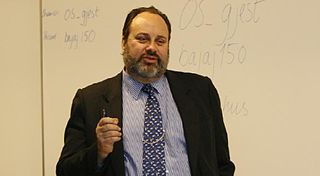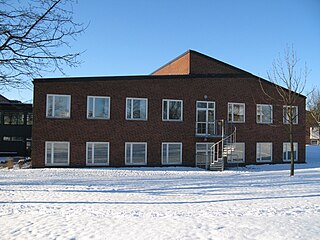
The Lisbon Strategy, also known as the Lisbon Agenda or Lisbon Process, was an action and development plan devised in 2000, for the economy of the European Union between 2000 and 2010. A pivotal role in its formulation was played by the Portuguese economist Maria João Rodrigues.
The concept of the innovation system stresses that the flow of technology and information among people, enterprises, and institutions is key to an innovative process. It contains the interactions between the actors needed in order to turn an idea into a process, product, or service on the market.

Hans Anders Rausing, KBE was a Swedish industrialist and philanthropist based in the United Kingdom. He made his fortune from his co-inheritance of Tetra Pak, a company founded by his father Ruben Rausing, and the largest food packaging company in the world. In the early 1980s Rausing moved to the United Kingdom to avoid Swedish taxes, in 1995 he sold his share of the company to his brother, Gad. In the Forbes world fortune ranking, Rausing was placed at number 83 with an estimated fortune of US$10 billion in 2011. According to Forbes, he was the second richest Swedish billionaire in 2013. By the time of his death in August 2019, Forbes estimated the net worth of Rausing and his family to be $12 billion.
Charles Raymond Plott is an American economist. He currently is Edward S. Harkness Professor of Economics and Political Science at the California Institute of Technology, Director, Laboratory for Experimental Economics and Political Science, and a pioneer in the field of experimental economics. His research is focused on the basic principles of process performance and the use of those principles in the design of new, decentralized processes to solve complex problems. Applications are found in mechanisms for allocating complex items such as the markets for pollution permits in Southern California, the FCC auction of licenses for Personal Communication Systems, the auctions for electric power in California, the allocation of landing rights at the major U.S. airports, access of private trains to public railway tracks, access to natural gas pipelines, the allocation of licenses for offshore aquaculture sites, the combinatorial sale of fleets of vehicles, and the application of complex procurements. Plott has contributed extensively to the development and application of a laboratory experimental methodology in the fields of economics and political science.
Mark Casson is a British economist and academic. He is a professor of economics at the University of Reading in England. He was Head of Department (1987–94) and is the institution's current Director of the Centre for Institutional Performance.

The European Association for Evolutionary Political Economy (EAEPE) is a pluralist forum of social scientists that brings together institutional and evolutionary economists broadly defined. EAEPE members are scholars working on realistic approaches to economic theory and economic policy. With a membership of about 500, EAEPE is now the foremost European association for heterodox economists and the second-largest association for economists in Europe.
Zoltan J. Acs is an American economist. He is Professor of Management at The London School of Economics (LSE), and a professor at George Mason University, where he teaches in the Schar School of Policy and Government and is the Director of the Center for Entrepreneurship and Public Policy. He is also a visiting professor at Imperial College Business School in London and affiliated with the University of Pecs in Hungary. He is co-editor and founder of Small Business Economics.

Robert Georges Picard is an American writer and scholar in the field of media businesses and media policy economics. He heavily influenced media economics studies.
David Bruce Audretsch is an American economist. He is a distinguished professor at the School of Public and Environmental Affairs (SPEA) at Indiana University and also serves as director of the SPEA International Office, Ameritech Chair of Economic Development, and director of SPEA's Institute for Development Strategies (IDS). He is co-founder and co-editor of Small Business Economics: An Entrepreneurship Journal, and also works as a consultant to the United Nations, the World Bank, the OECD, the EU Commission, and the U.S. Department of State. He was the Director of the Entrepreneurship, Growth and Public Policy Group at the Max Planck Institute of Economics in Germany from 2003 to 2009. Since 2020, he also serves as a Distinguished Professor in the Department of Innovation Management and Entrepreneurship at the University of Klagenfurt.

Barbara Czarniawska is an organization scholar.
Christopher Freeman a British economist, recognised as one of the founders of the post-war school of Innovation Studies. He played a lead role in the development of the neo-Schumpeterian tradition focusing on the crucial role of innovation for economic development and of scientific and technological activities for well-being.
Bengt-Åke Lundvall is an emeritus professor in economics at the Department of Business and Management at Aalborg University.
Luke Georghiou is Deputy President and Deputy Vice-Chancellor at the University of Manchester. He is also professor of science and technology policy and management at the Manchester Institute of Innovation Research at Manchester Business School.

The Centre for Innovation, Research and Competence in the Learning Economy (CIRCLE) is an interdisciplinary research centre situated in Lund, Sweden. It is spanning several faculties at Lund University and Blekinge Institute of Technology. The activities cover the field of innovation, entrepreneurship, knowledge creation and economic growth.
Jan Fagerberg is professor at the University of Oslo, Norway.
Demand articulation is a concept developed within the scientific field of innovation studies which serves to explain learning processes about needs for new and emerging technologies. Emerging technologies are technologies in their early phase of development, which have not resulted in concrete products yet. Many characteristics of these technologies, such as the technological aspects but also the needs of users concerning the technology, have not been specified yet. Demand articulation can be defined as ‘iterative, inherently creative processes in which stakeholders try to address what they perceive as important characteristics of, and attempt to unravel preferences for an emerging innovation’.

Gad Rausing was a Swedish industrialist and archaeologist. Together with his brother Hans he inherited the Swedish packaging company Tetra Pak, founded by their father Ruben Rausing and by 2011 the largest food packaging company in the world by sales. In 1995 Rausing bought out his brother's interest in the company in what was at the time the most extensive private buyout in Europe.
The Reading School of International Business is widely understood in the field of international business (IB), management and economics to embody a stream of conceptual, and theoretically-driven empirical research, and consists of a group ofpoxkkdkforovhhlfl
a common approach to analyzing multinational enterprise and foreign direct investment. Some are based in the Department of Economics and in Henley Business School at the University of Reading, England, but membership is international. The Reading School builds upon the pathbreaking theoretical work of Peter Buckley and Mark Casson on internalization theory. This was complemented by simultaneous work by John Dunning as he developed the eclectic paradigm of international business as an envelope explanation containing three principal drivers of foreign direct investment, comprising ownership (O); location (L); and internalization (I). The Reading School approach continues through the work of its academic disciples around the world, as well as through The John Dunning Centre at Henley Business School, University of Reading, under the directorship of Rajneesh Narula.
Claude Ménard is a Canadian economist and professor at the University of Paris I: Panthéon-Sorbonne. Ménard is also the creator and former director of the Centre d'analyse théorique des organisations et des marchés (ATOM), which merged with the Centre d'Economie de la Sorbonne in 2009, as well as a co-founder of the Society for Institutional & Organizational Economics. His research focuses on institutional and organizational economics.

Research Policy is a peer-reviewed academic journal published by Elsevier on behalf of the Science Policy Research Unit (SPRU). It was established by British economist Christopher Freeman in 1971 and is regarded as the leading journal in the field of innovation studies. It is listed as one of the 50 journals used by the Financial Times to compile its business-school research ranks.








